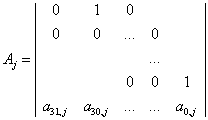Notes for Intel® oneAPI Math Kernel Library Vector Statistics
A newer version of this document is available. Customers should click here to go to the newest version.
MT2203
This is a set of 6024 Mersenne Twister pseudorandom number generators (j = 1, ..., 6024):
 ,
,
 ,
,
 ,
,
 ,
,
 ,
,
 ,
,
 .
.
Matrix Aj(32x32) has the following format:
 ,
,
with the 32-bit vector aj = a31,j ... a0,j.
The set of 6024 basic pseudorandom number generators MT2203 is a natural addition to MT19937 generator. MT2203 generators are intended for use in large scale Monte Carlo simulations performed on multi-processor computer systems. These generators possess a smaller period length but the number of 22203 to the method described in [Matsum2000].
Real Implementation (Single and Double Precision)
The output vector is the sequence of the floating-point values u0, u1, ... .
Integer Implementation
The output vector of 32-bit integers y0,j, y1,j, ... .
Stream Initialization by Function vslNewStream
MT2203 generates the stream and initializes it specifying the input 32-bit unsigned integer parameter seed. The stream state, that is, the array of 69 32-bit integers x0, ..., x68, is initialized by the procedure described in [MT2002] and based on the seed value.
MT2203 generator is a set of 6024 basic generators. To select an MT2203 generator, add an offset to the named constant VSL_BRNG_MT2203, for example, VSL_BRNG_MT2203+0, VSL_BRNG_ MT2203+1, ... . The following example illustrates the initialization of the 10th (of 6024) MT2203 generator:
vslNewStream (&stream, VSL_BRNG_MT2203+9, seed);
Stream Initialization of Function vslNewStreamEx
MT2203 generates the stream and initializes it specifying the array params[] of n 32-bit unsigned integers:
If n ≥ 1, perform initialization as described in [MT2002] using array params[]on input.
If n = 0, assume params[0] = 1, n = 1 and perform initialization as described in the previous item.
Subsequences Selection Methods
vslSkipAheadStream |
Not supported |
vslSkipAheadStreamEx |
Not supported |
vslLeapfrogStream |
Not supported |
Generator Period

Empirical Testing Results Summary
| Test Name | vsRngUniform |
vdRngUniform |
viRngUniform |
viRngUniformBits |
|---|---|---|---|---|
| 3D Spheres Test | OK (20% errors) | OK (20% errors) | Not applicable | OK (20% errors) |
| Birthday Spacing Test | Not applicable | Not applicable | Not applicable | OK (0% errors) |
| Bitstream Test | Not applicable | Not applicable | Not applicable | OK (15% errors) |
| Rank of 31x31 Binary Matrices Test | Not applicable | Not applicable | Not applicable | OK (10% errors) |
| Rank of 32x32 Binary Matrices Test | Not applicable | Not applicable | Not applicable | OK (0% errors) |
| Rank of 6x8 Binary Matrices Test | Not applicable | Not applicable | Not applicable | OK (0% errors) |
| Counts-the-1’s Test (stream of bits) | Not applicable | Not applicable | Not applicable | OK (0% errors) |
| Counts-the-1’s Test (stream of specific bytes) | Not applicable | Not applicable | Not applicable | OK (0% errors) |
| Craps Test | OK (20% errors) | OK (20% errors) | OK (20% errors) | OK (20% errors) |
| Parking Lot Test | OK (0% errors) | OK (0% errors) | Not applicable | OK (0% errors) |
| 2D Self-Avoiding Random Walk Test | OK (10% errors) | OK (0% errors) | Not applicable | OK (0% errors) |
The tabulated data is obtained using the one-level (threshold) testing technique. The OK result indicates FAIL < 50%. The run fails when p-value falls outside the interval [0.05, 0.95].
The stream tested is generated by calling the function vslNewStream with seed=7,777,777.